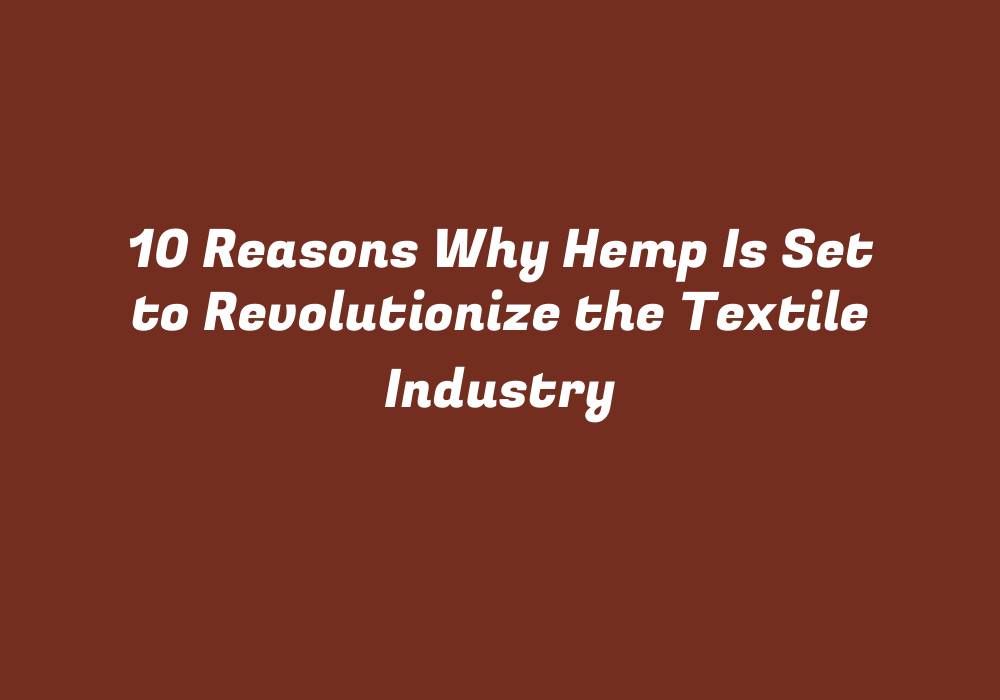Introduction: The Rise of Hemp in the Textile Industry
Hemp has long been known for its numerous uses, from being a source of fiber to offering health benefits. Now, it’s poised to make a significant impact on another industry – textiles. Once relegated to niche markets, hemp is gaining popularity as a sustainable and environmentally friendly alternative in the fashion world. This article will discuss 10 reasons why this versatile plant is set to revolutionize the textile industry.
1. Sustainability
Firstly, the cultivation of hemp is eco-friendly and sustainable. It requires minimal water consumption compared to conventional cotton, which demands massive quantities for irrigation. Additionally, hemp crops can be grown in various climates, thereby reducing carbon emissions associated with transportation over long distances. By opting for hemp-based fabrics, businesses are taking steps towards a more eco-conscious approach to fashion production.
2. Biodegradability
Hemp is 100% biodegradable, which means that it can be disposed of without causing harm to the environment or creating additional waste in landfills. When hemp fibers are incorporated into textile production, they offer an alternative to synthetic fabrics that take years or even centuries to decompose. By selecting hemp-based materials, brands can contribute positively to the fight against plastic pollution and other environmental concerns.
3. Durability
The strength of hemp fibers provides exceptional durability, which translates into long-lasting apparel. Hemp clothing has been known to hold up well even with frequent washing or use, prolonging the lifespan of garments and reducing textile waste that ends up in landfills. By choosing hemp for their collections, fashion brands can encourage consumers to invest in high-quality pieces that are built to last.
4. Versatility
Hemp is highly versatile, with fibers suitable for producing various textile materials such as canvas, twill, denim, and even silk-like fabrics. This adaptability allows designers and manufacturers to incorporate hemp into a wide range of clothing styles, from casual wear to formal attire. In turn, this versatility supports the development of innovative fashion pieces that cater to diverse consumer preferences.
5. Comfort
Hemp-based fabrics are breathable and have a soft texture that can be worn next to the skin comfortably. Additionally, they regulate body temperature effectively, making them suitable for various climates and weather conditions. By choosing hemp clothing, fashion enthusiasts can invest in pieces that offer both style and comfort, catering to their personal preferences while contributing to a more sustainable lifestyle.
6. Antimicrobial Properties
Hemp fibers possess natural antimicrobial properties due to the presence of cannabidiol (CBD), an organic compound that acts as a natural disinfectant. This characteristic makes hemp ideal for creating garments that can prevent bacteria and fungi growth, promoting healthier skin and reducing odor-causing microorganisms. With this feature in mind, hemp clothing could become popular among people seeking sustainable alternatives to synthetic fabrics with added health benefits.
7. Health Benefits
The production of hemp does not require the use of harmful chemicals or pesticides, which can potentially irritate the skin and cause allergic reactions. Hemp clothing, therefore, is often more suitable for individuals with sensitive skin who may experience discomfort when wearing synthetic textiles. By incorporating hemp into their wardrobes, people can reap the benefits of a healthier, eco-friendly fashion choice.
8. Responsible Sourcing
Hemp cultivation is regulated by strict guidelines in many countries to ensure that it is not associated with illegal drug production or harmful farming practices. This regulatory environment makes hemp a responsible and traceable source of fibers, allowing consumers to make informed choices about their fashion purchases based on environmental and social factors.
9. Economic Boost
The revival of the hemp textile industry can bring numerous economic benefits, including job creation in farming and manufacturing sectors. As demand for hemp-based clothing increases, this sustainable alternative will likely spur innovation, create new markets, and contribute to a more robust economy. Moreover, investing in hemp production and processing can help promote local economies and reduce dependency on imports of synthetic textiles.
10. A New Era for Fashion
As consumers become more aware of the environmental impact of their choices, they are increasingly seeking sustainable options across all industries, including fashion. By embracing hemp as a viable alternative to conventional fabrics, the textile industry has the opportunity to revolutionize and adapt to evolving consumer demands while reducing its carbon footprint. In turn, this shift will create an environment where ethical and eco-friendly fashion can thrive and become more accessible for people around the world.
In conclusion, hemp has the potential to revolutionize the textile industry by offering sustainable, versatile, and healthier alternatives to conventional fabrics. As awareness about its benefits grows, we are poised to witness a transformation in the way fashion is produced and consumed. By embracing this promising resource, businesses and consumers can contribute to a cleaner, greener future while enjoying the many advantages of incorporating hemp into their wardrobes.
